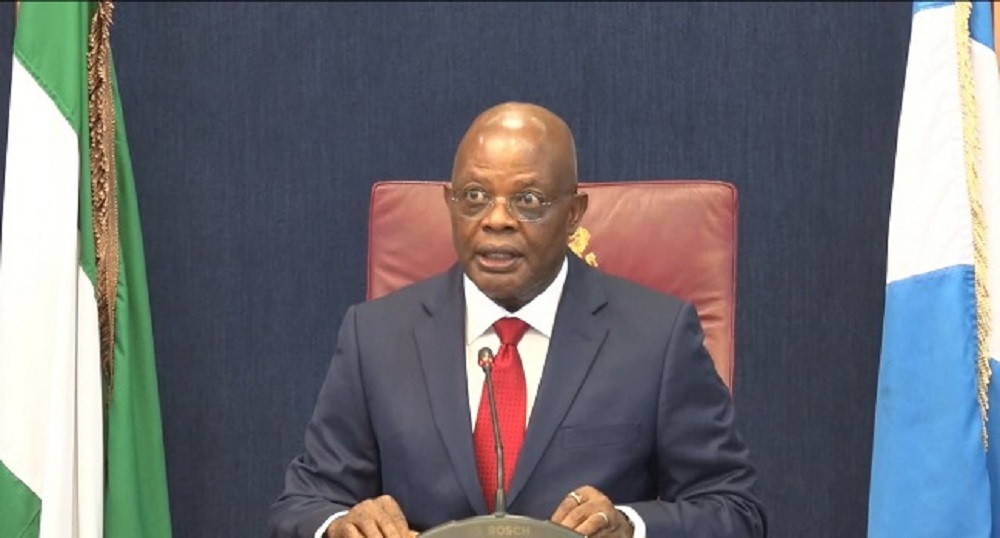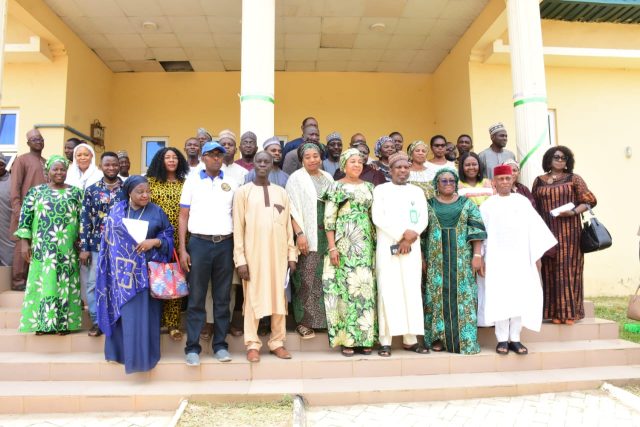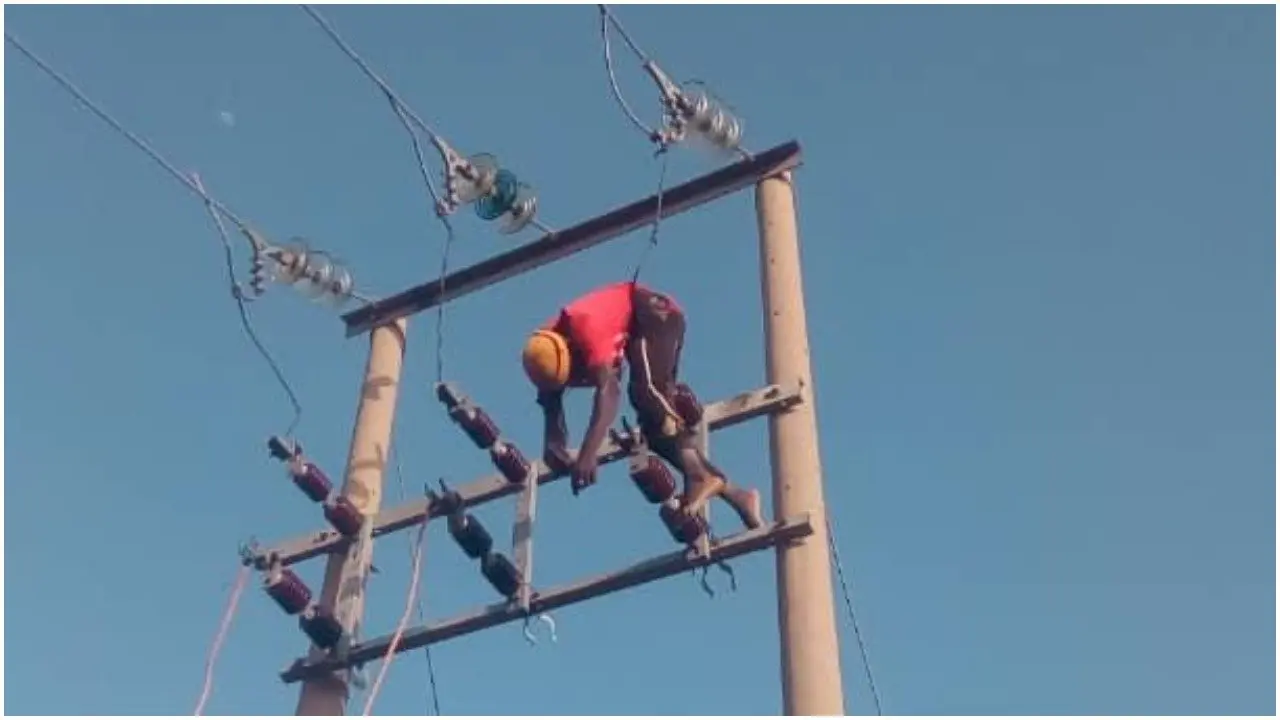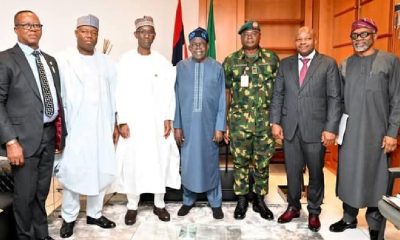News
NGO donates 200 sanitary pads to teenage students+Photos

By Kayode Sanni-Arewa
A non-governmental organization, Queen Lizzy Shades and More, on Friday, donated over 200 sanitary pads to girls of the Army Day Secondary School, FCT-Abuja.
The CEO of the Queen Lizzy Shades and More, Queen Elizabeth Agbor, while addressing newsmen during a “Pad a Girl Campaign” at the school, called on other non-governmental organizations to also help in empowering most of these students.
She said, “We came to Army Day barracks to empower the female students to enlighten them on how to take care of themselves on personal hygiene before, during and after their period and also several awareness on cervical cancer and blockage of the tube.
“So we are here to give them the basic knowledge that they need to know, how to take care of themselves during their period, in order for them not to get infected. And after that we empower them by giving them sanitary pads to take care of themselves.

“I’m appealing to the federal government and other NGOs as well to come out and give a helping hand in empowering most of these students. During the course of this program, a child told me that she comes to school on her period without pad.
“She said anytime she goes to meet her aunty, she would tell her to use her pant or leather, that the aunty doesn’t give her any pads to use. So I’m appealing to the federal government, if they can be giving out pads to students while on their menstrual period, it will go a long way.

“I’m also suggesting that if sanitary pads can be made free for students, not for all females but for students from 13-16 years that cannot afford pad, it will be a good initiative.”
Fielding questions from journalists, a Public Health Practitioner in the Health Strategy and Health Foundation, Kayode Alabi, said there was nothing wrong in taking drugs to help with pain during menstrual cycle but should be taken with prescription.

According to him, “A lot of propaganda is out there on taking pills before, during and after menstruation. Science has proven that there’s nothing bad in taking pills, especially nonsteroidal anti-inflammatory drugs, talking about ibuprofen and paracetamol. It can be taken before the menstruation, there’s nothing bad in that because it helps to relieve pain.
“It won’t affect the fertility of the girl, it’s just to help suppress the pain that the person will be passing through during the menstruation.”
Also speaking, an Estate Surveyor, Ogar Okoli, lauded the organisation over their initiative to conduct an awareness for the students and gifting of sanitary pads.
On her part, CEO Vervirds Palmoil, Edidiong Iorver, said it was a dream come true for Queen Lizzy and called on all girls to be hygienic when going through their menstrual cycle.
She said, “This is a dream come true for Queen Lizzy, she has had this project in mind right from when she has been a teenager and we are glad to be here to show our support. Generally, girls should take their hygiene seriously when seeing their period.

“We know things are not easy for some people and some families that don’t have the means to educate their girl-child on the need to take care of themselves during menstruation. At least with the little effort we have done today, the girls here will be very hygienic when it comes to their menstrual cycle.”
Giving her appreciation, a Student in the senior secondary section of the school, Samuel Blessing, said “It’s nice for them to reach out to us because most people do not have this awareness but hopefully with them being here today, I’m sure most people would have learnt one or two things from it.”
News
JUST IN: Rivers Sole Administrator Ibas Shun Reps Panel

News
FCT Flags Off One-Week Free Holiday Vocational and Entrepreneurship Training

In a move to foster skills acquisition and promote economic empowerment, the Federal Capital Territory (FCT) Education Secretariat through the Department of Mass Education has flagged off a one-week free holiday vocational and entrepreneurship training program.
The program is a collaborative initiative of the FCT Department of Mass Education, The Potter’s Wheel Foundation, and the Nigerian Non-Governmental Association for Literacy Support Services (NOGALSS).
Speaking at the flag-off ceremony, the FCT Mandate Secretary for Education, Dr. Danlami Hayyo emphasized the Importance of skills acquisition and entrepreneurship in today’s world describing it as imperative to be self reliant , empowered and resourceful.
He highlighted the Wike- led FCT Administration’s commitment to championing the Renewed Hope Agenda adding that the initiative is a critical strategy for reducing unemployment and building resilience among Abuja residents through practical skill acquisition and entrepreneurship training.
He commended the Department on the synergy between the government and non-governmental organizations noting that it will further empower the people of the FCT with skills and knowledge that lead to viable income-generating opportunities.
He urged the participants to fully utilize the opportunity, network actively and apply themselves diligently to the various training sessions.
In her welcome address,Dr. Favour Edem -Nse,the Director, FCT Department of Mass Education said,the training aligns with Sustainable Development Goals ( SDGs) and contributes significantly to reducing the number of out- of- school children, unskilled youths and unemployed women in the Federal Capital Territory.
She added that, the Department goal is not just to train but to guide participants towards becoming self – sufficient and successful entrepreneurs .
She noted that the one week free training program is a manifestation of the Department ‘s broader vision of literacy and lifelong learning.
She revealed that the Department in collaboration with The Potter’s Wheel Foundation and the Nigerian Non- Governmental Association for Literacy Support Services( NOGALSS) will train them hands on session in production of laundry soap,bleach , liquid soap, toilet and car wash , disinfectant,air freshener,snack among others as well as key entrepreneurship modules on Bookkeeping and financial management, marketing and branding with social media management.
She expressed her gratitude to the Mandate Secretary for Education and the Management for the massive support of the life changing opportunity program targeted at women,youths, children and other community residents to equip them with tools for economic self reliance .
The well attended program which drew partner organizations, staff of the Department of Mass Education and enthusiastic participants will run throughout the week with facilitators providing continued support beyond the training period.
News
Sad! Electrician electrocuted in Oyo

A 28-year-old electrician, whose name has not been revealed, has been electrocuted in Oyo State at Eruwa in Ibarapa East of Oyo State.
The victim was electrocuted at the Odo Babaode area of the town.
The man was electrocuted on a high-tension cable belonging to the Ibadan Electricity Distribution Company (IBEDC).
The incident occurred when the victim was trying to rectify an electrical fault on the active power lines without being shut down from the feeder.
The General Manager of Oyo State Fire Service, Mr Yemi Akinyinka, who confirmed the development, said a distress call was received by the agency Wednesday afternoon.
He said, “The distressed call was reported at 15:29hrs on Wednesday, 23rd April, 2025.
“The fire personnel led by PFS1 Peluola Babatunde quickly followed the caller and on arrival at the place, we met the victim already electrocuted, and all necessary precautionary measures were observed so as to safeguard the citizens within the vicinity.
“The man was recovered and handed over to a team of police from Eruwa police Station. The incident occurred when the victim (electrician) was trying to rectify an electrical fault on the active power lines without shutting down the feeder.”
-

 News22 hours ago
News22 hours agoINSECURITY! Enough is enough, Tinubu tells security chiefs, NSA
-

 News22 hours ago
News22 hours agoJust in: Air Peace suspends all scheduled flights nationwide
-

 News21 hours ago
News21 hours agoINEC moves to legalise voting without PVC
-

 News17 hours ago
News17 hours agoJust in: PDP can never die over gale of defection -Hon Teejay Yusuf insists
-

 Economy13 hours ago
Economy13 hours agoSEE current exchange rate of the Dollar to Naira
-

 News10 hours ago
News10 hours agoJUST IN: Rivers Sole Administrator Ibas Shun Reps Panel
-

 Politics22 hours ago
Politics22 hours agoFCT minister, Wike, Uzodinma hail Okowa/Oborevwori defection to APC
-

 Opinion19 hours ago
Opinion19 hours agoCBN under Cardoso and $6.83 Billion balance of payments surplus in 2024 that signals economic resurgence




